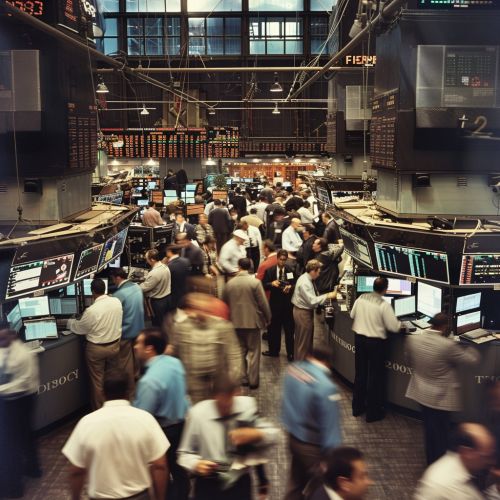Stock Exchange
Overview
A stock exchange is a marketplace where stocks, bonds, commodities, derivatives, and other financial instruments are traded. Stock exchanges bring together buyers and sellers, enabling them to negotiate prices and make trades. The stock exchange ensures fair and orderly trading and the efficient dissemination of price information for any securities listed on the exchange.
History
The concept of a stock exchange dates back to the 12th century when French courratiers de change were concerned with managing and regulating the debts of agricultural communities on behalf of the banks. However, the first stock exchange as we know it today was established in Antwerp, Belgium, in 1531. The Amsterdam Stock Exchange, established in 1602 by the Dutch East India Company, was the first exchange to formally start trading in securities.


Function
The primary function of a stock exchange is to provide a centralized, regulated location where companies can raise capital from investors. Companies do this by listing their shares on the exchange, where they are bought and sold by traders and investors. This process is known as initial public offering (IPO).
Trading Mechanism
Trading on a stock exchange is conducted by members known as brokers. These brokers, who act as intermediaries between buyers and sellers, use a system of bidding and offering to buy or sell stocks. This system is known as an auction method. In some exchanges, the auction is conducted electronically, while in others, it is conducted on a physical trading floor.
Types of Stock Exchanges
There are two main types of stock exchanges: traditional exchanges and electronic communication networks (ECNs). Traditional exchanges, also known as "brick-and-mortar" exchanges, have physical locations where transactions are carried out on a trading floor. The New York Stock Exchange (NYSE) is an example of a traditional exchange.
On the other hand, ECNs, such as the NASDAQ, are electronic trading systems that automatically match buy and sell orders at specified prices.
Global Stock Exchanges
There are numerous stock exchanges around the world, each serving a particular country or region's economy. Some of the largest and most influential stock exchanges include the New York Stock Exchange (NYSE), the NASDAQ, the London Stock Exchange (LSE), the Tokyo Stock Exchange (TSE), and the Shanghai Stock Exchange (SSE).
Regulation
Stock exchanges operate under the regulation of the government regulatory bodies. In the United States, the Securities and Exchange Commission (SEC) is the primary regulatory body. These regulatory bodies are responsible for enforcing fair trading practices, protecting investors, and ensuring that the market is transparent and efficient.
Impact on Economy
Stock exchanges play a crucial role in the economy. They allow companies to raise capital, which they can use to expand their businesses, create jobs, and contribute to economic growth. Additionally, they provide a venue for investors to earn returns on their investments, contributing to individual wealth.
